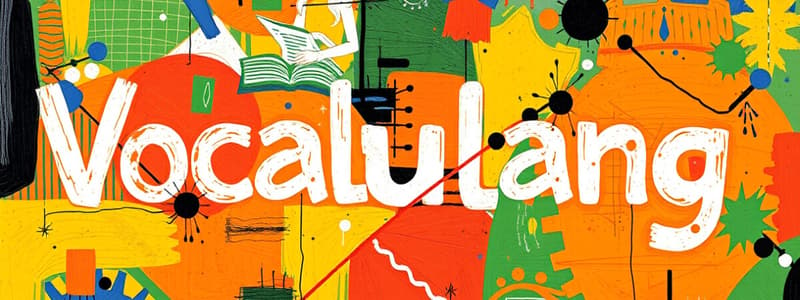Podcast
Questions and Answers
What is one of the main benefits of enhancing vocabulary?
What is one of the main benefits of enhancing vocabulary?
- Improved memory retention of unrelated information
- Increased difficulty in understanding spoken language
- Enhanced communication skills (correct)
- Reduction in the need for reading
Which method is considered effective for vocabulary retention?
Which method is considered effective for vocabulary retention?
- Learning words without context
- Creating word lists and reviewing them regularly (correct)
- Avoiding the use of new words in conversation
- Memorizing definitions without examples
What type of learning involves understanding new words through their usage in sentences?
What type of learning involves understanding new words through their usage in sentences?
- Technical learning
- Isolated learning
- Passive learning
- Contextual learning (correct)
What does effective communication require?
What does effective communication require?
Which of the following methods can be used to memorize new vocabulary?
Which of the following methods can be used to memorize new vocabulary?
What type of language consists of words that are spoken or written?
What type of language consists of words that are spoken or written?
What role does feedback play in the communication process?
What role does feedback play in the communication process?
What barrier to communication arises from variations in dialects and vocabulary?
What barrier to communication arises from variations in dialects and vocabulary?
Which technique is not typically used to enhance vocabulary?
Which technique is not typically used to enhance vocabulary?
How can one adapt their communication style effectively?
How can one adapt their communication style effectively?
Flashcards are hidden until you start studying
Study Notes
Vocabulary Building
- Importance of Vocabulary: Enhances communication skills, comprehension, and expression.
- Methods to Build Vocabulary:
- Reading: Engage with diverse materials (books, articles, etc.).
- Contextual Learning: Learn new words in context rather than isolation.
- Word Lists: Create lists of new words and review them regularly.
- Flashcards: Use flashcards for memorization and self-testing.
- Synonyms and Antonyms: Explore words with similar and opposite meanings.
- Word Games: Engage in puzzles and games (Scrabble, crosswords).
- Techniques:
- Root Analysis: Understand prefixes, suffixes, and root words.
- Mnemonic Devices: Use memory aids to remember new vocabulary.
- Daily Practice: Incorporate new words into daily conversations and writing.
Language and Communication
- Language: A system of symbols and rules used for communication.
- Types of Language:
- Verbal: Spoken or written words.
- Non-verbal: Body language, gestures, facial expressions.
- Visual: Use of images, charts, and symbols to convey messages.
- Communication Process:
- Sender: The person conveying the message.
- Message: The information being communicated.
- Medium: The method used to transmit the message (speech, text, etc.).
- Receiver: The individual(s) receiving and interpreting the message.
- Feedback: The response from the receiver to the sender.
- Effective Communication:
- Clarity: Be clear and concise in expression.
- Active Listening: Engage and respond appropriately to what others say.
- Empathy: Understand and acknowledge the emotions and perspectives of others.
- Adaptability: Adjust language and style based on the audience and context.
- Barriers to Communication:
- Language Differences: Variations in dialects or vocabulary.
- Cultural Differences: Distinct cultural norms and values that affect interpretation.
- Noise: Physical or psychological distractions that hinder effective communication.
Vocabulary Building
- Vocabulary is crucial for enhancing communication skills, comprehension, and self-expression.
- Engaging with diverse reading materials such as books and articles fosters vocabulary growth.
- Learning new words in context improves retention and understanding compared to studying them in isolation.
- Creating and regularly reviewing word lists helps reinforce memory.
- Utilizing flashcards for vocabulary allows for effective memorization and self-assessment.
- Exploring synonyms and antonyms broadens understanding of word meanings and usages.
- Participating in word games, including Scrabble and crosswords, makes learning vocabulary fun and engaging.
- Analyzing roots, prefixes, and suffixes leads to a deeper understanding of word formation and meanings.
- Mnemonic devices serve as helpful memory aids for recalling new vocabulary.
- Daily practice of incorporating new vocabulary into conversations and writing solidifies learning.
Language and Communication
- Language comprises symbols and rules that facilitate communication between individuals.
- Verbal language includes both spoken and written forms of expression.
- Non-verbal communication involves body language, gestures, and facial expressions, conveying messages without words.
- Visual communication uses images, charts, and symbols to represent ideas and information.
- The communication process consists of several components: the sender, message, medium of transmission, receiver, and feedback.
- Effective communication requires clarity to express ideas clearly and concisely.
- Active listening is essential for engaging with the speaker and responding appropriately to their message.
- Empathy allows individuals to understand and acknowledge other people’s emotions and viewpoints.
- Adaptability involves changing language and style according to the audience and context for better understanding.
- Barriers to effective communication include language differences, cultural variations, and noise, which may hinder the transmission and interpretation of messages.
Studying That Suits You
Use AI to generate personalized quizzes and flashcards to suit your learning preferences.




